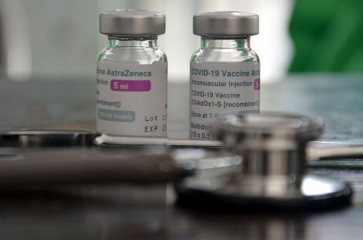Popular Reads
Top Results
Can't find what you're looking for?
View all search resultsPopular Reads
Top Results
Can't find what you're looking for?
View all search results[ANALYSIS] Reflecting on public health as part of economic recovery
If the pandemic has taught us one thing, it is that public health and economic recovery must go hand in hand.
Change text size
Gift Premium Articles
to Anyone
W
hen the COVID-19 pandemic hit the world in 2020, it became the ultimate test for every government on the readiness of their public health system and medical institutions to respond the crisis. Countries that have been responsive and vigilant in their policies on mitigating the viral infection, such as Taiwan, Singapore, South Korea and New Zealand, are more likely to see faster recovery of economic growth than those that have not.
Failure to step up responsively with the right public health strategy to mitigate and control the pandemic would result in slower recovery. Hence, it is important for the government to focus on public health as part of its path to economic recovery.
As an archipelagic country with 17,000 islands, Indonesia already has challenges in logistics and infrastructure. Located on the Ring of Fire, Indonesia is also prone to various natural disasters, including volcanic eruptions, typhoons, landslides and floods. The COVID-19 pandemic has thus had a severe impact on its 260 million population, mainly due to a delayed response to the crisis as well as an inadequate public health system and infrastructure.
The fatality rate as of April 17, 2021 stood at 2.7 percent, or 43,328 deaths out of 1,599,763 confirmed cases, according to Health Ministry data. Although the recovery rate has increased to 90.7 percent, the positivity rate remains high at 17.3 percent and the infection rate at 6.6 percent, ranked the fifth highest in Asia.
Despite the ministry’s 2015-2019 Strategic Plan (Renstra), which targets several key concerns such as better health services for mothers and children, improving disease control, expanding coverage under the national health insurance (BPJS Kesehatan) and more access to medicines and vaccines, Indonesia still faces several public health challenges, especially in containing and mitigating COVID-19.
To support economic recovery, the government launched the National Economic Recovery (PEN) program with a 2021 budget of almost Rp 700 trillion (US$48.3 billion). The health sector allocation as of March 2021 was Rp 176.40 trillion, or 25.2 percent of the program’s total budget. However, less than 45 percent of last year’s health allocation was realized.
In the health sector, the PEN program provides incentives to health workers, procures medical equipment, supports COVID-19 treatments, sets up isolation facilities and most importantly, rolls out the mass vaccination program. The government has targeted vaccinating more than 181 million Indonesians this year, or 70 percent of the population.


















